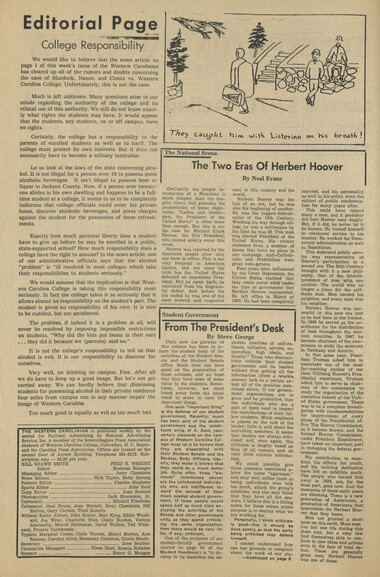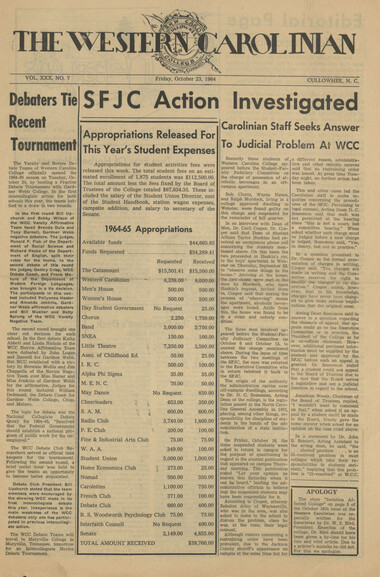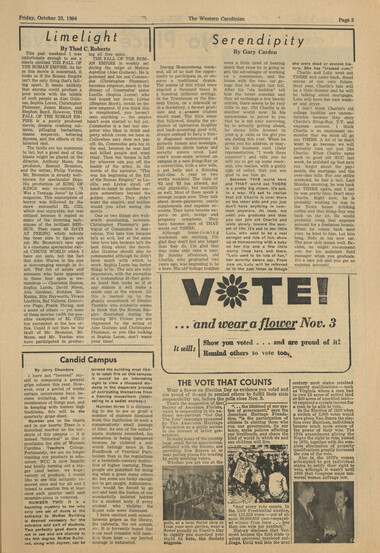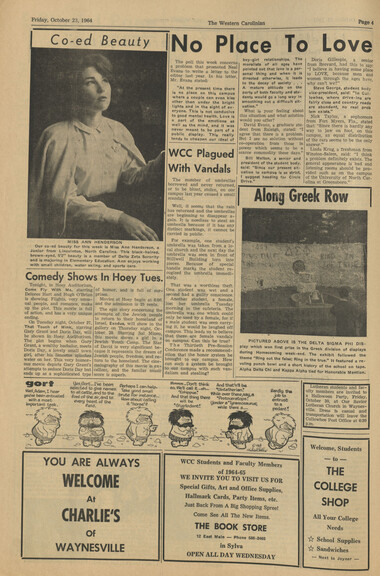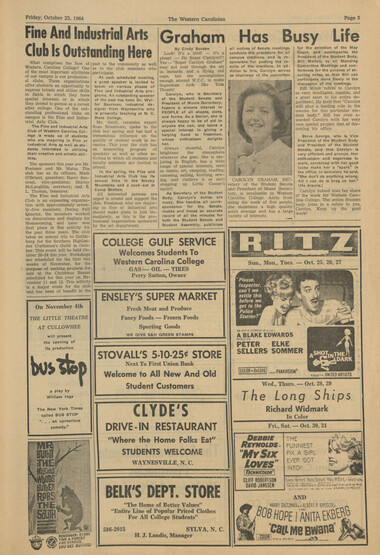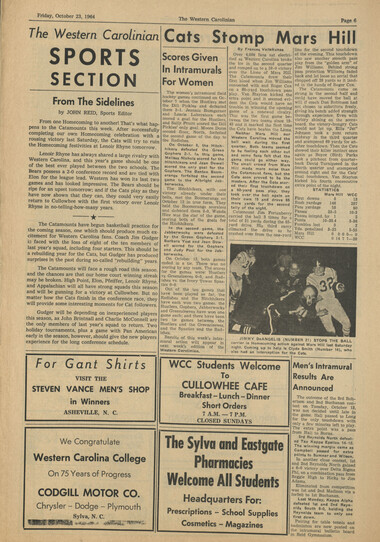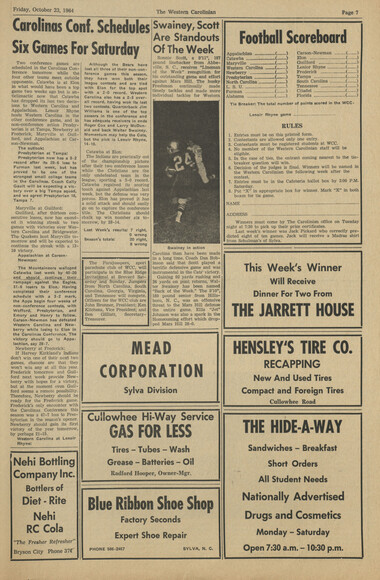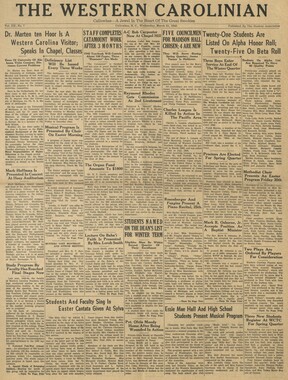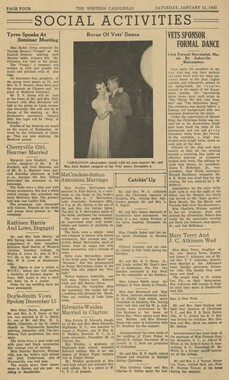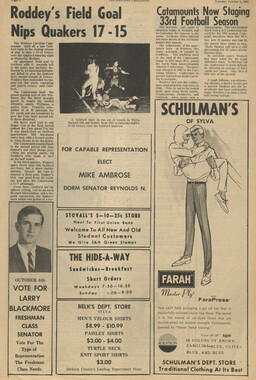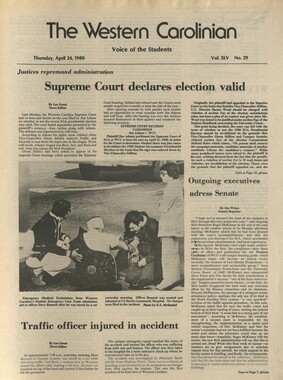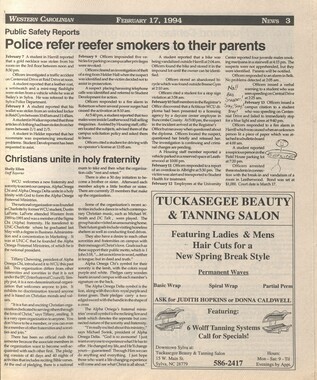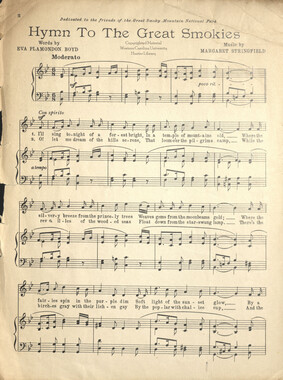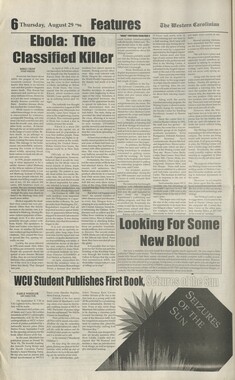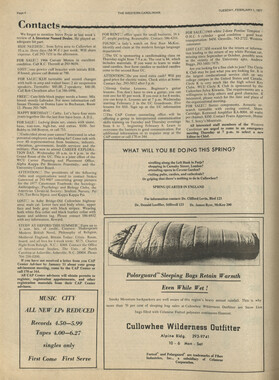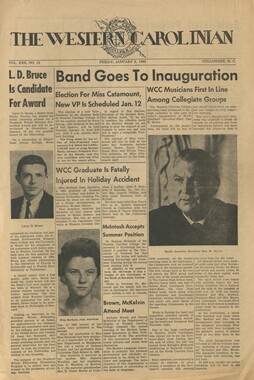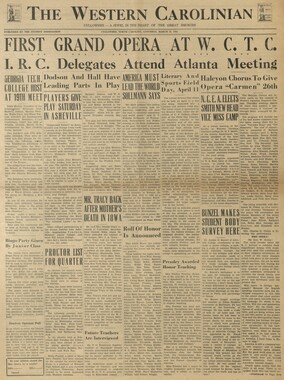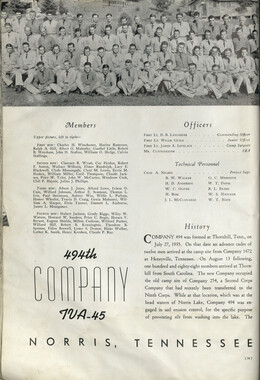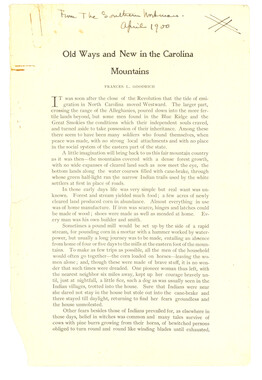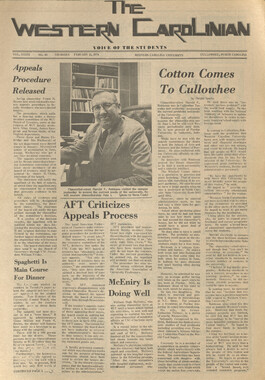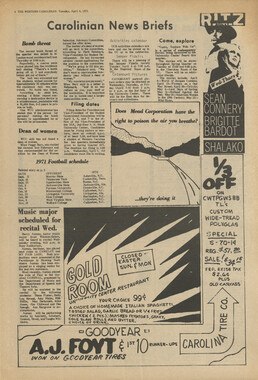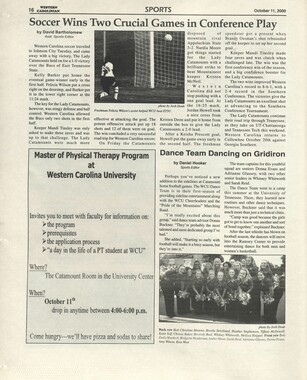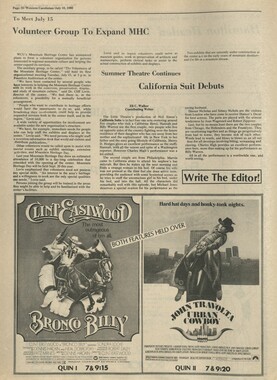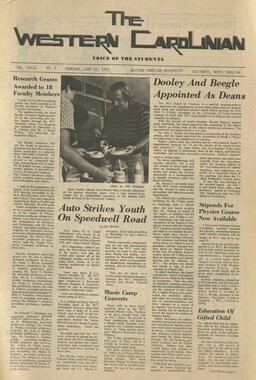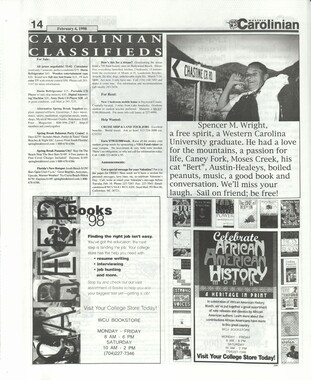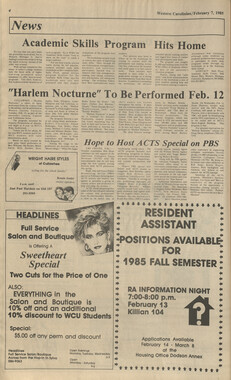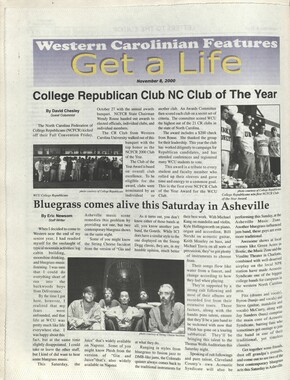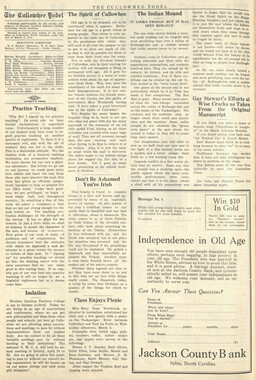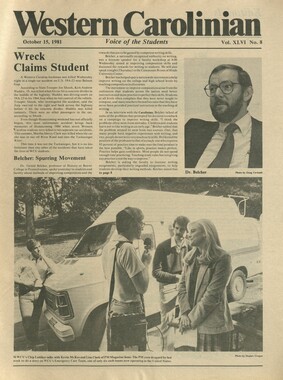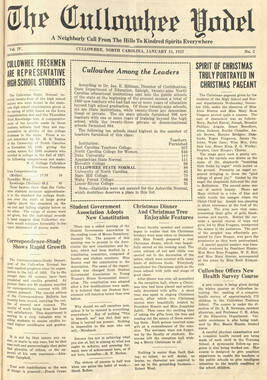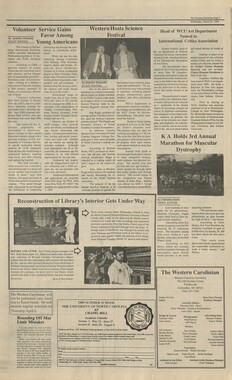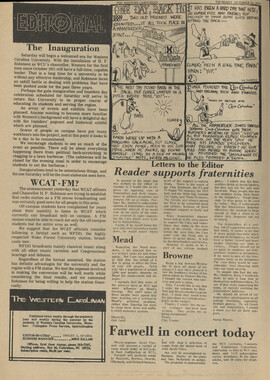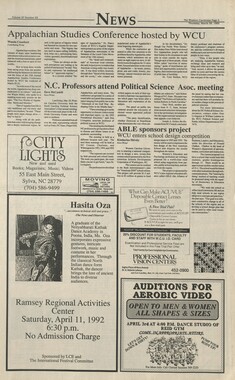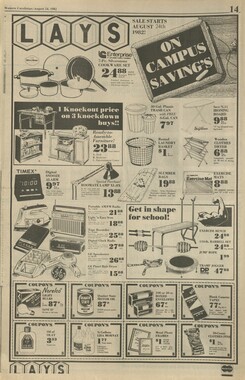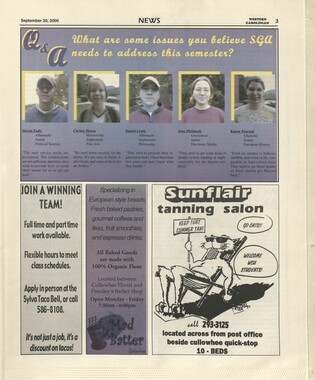Western Carolina University (20)
View all
- Canton Champion Fibre Company (2308)
- Cherokee Traditions (293)
- Civil War in Southern Appalachia (165)
- Craft Revival (1942)
- Great Smoky Mountains - A Park for America (2767)
- Highlights from Western Carolina University (430)
- Horace Kephart (941)
- Journeys Through Jackson (154)
- LGBTQIA+ Archive of Jackson County (19)
- Oral Histories of Western North Carolina (314)
- Picturing Appalachia (6679)
- Stories of Mountain Folk (413)
- Travel Western North Carolina (160)
- Western Carolina University Fine Art Museum Vitreograph Collection (129)
- Western Carolina University Herbarium (92)
- Western Carolina University: Making Memories (708)
- Western Carolina University Publications (2283)
- Western Carolina University Restricted Electronic Theses and Dissertations (146)
- Western North Carolina Regional Maps (71)
- World War II in Southern Appalachia (131)
University of North Carolina Asheville (6)
View all
- Western Carolina College (199)
- Western Carolina Teachers College (239)
- Western Carolina University (1792)
- Allanstand Cottage Industries (0)
- Appalachian National Park Association (0)
- Bennett, Kelly, 1890-1974 (0)
- Berry, Walter (0)
- Brasstown Carvers (0)
- Cain, Doreyl Ammons (0)
- Carver, George Washington, 1864?-1943 (0)
- Cathey, Joseph, 1803-1874 (0)
- Champion Fibre Company (0)
- Champion Paper and Fibre Company (0)
- Cherokee Indian Fair Association (0)
- Cherokee Language Program (0)
- Crittenden, Lorraine (0)
- Crowe, Amanda (0)
- Edmonston, Thomas Benton, 1842-1907 (0)
- Ensley, A. L. (Abraham Lincoln), 1865-1948 (0)
- Fromer, Irving Rhodes, 1913-1994 (0)
- George Butz (BFS 1907) (0)
- Goodrich, Frances Louisa (0)
- Grant, George Alexander, 1891-1964 (0)
- Heard, Marian Gladys (0)
- Kephart, Calvin, 1883-1969 (0)
- Kephart, Horace, 1862-1931 (0)
- Kephart, Laura, 1862-1954 (0)
- Laney, Gideon Thomas, 1889-1976 (0)
- Masa, George, 1881-1933 (0)
- McElhinney, William Julian, 1896-1953 (0)
- Niggli, Josephina, 1910-1983 (0)
- North Carolina Park Commission (0)
- Osborne, Kezia Stradley (0)
- Owens, Samuel Robert, 1918-1995 (0)
- Penland Weavers and Potters (0)
- Rhodes, Judy (0)
- Roberts, Vivienne (0)
- Roth, Albert, 1890-1974 (0)
- Schenck, Carl Alwin, 1868-1955 (0)
- Sherrill's Photography Studio (0)
- Smith, Edward Clark (0)
- Southern Highland Handicraft Guild (0)
- Southern Highlanders, Inc. (0)
- Stalcup, Jesse Bryson (0)
- Stearns, I. K. (0)
- Thompson, James Edward, 1880-1976 (0)
- United States. Indian Arts and Crafts Board (0)
- USFS (0)
- Vance, Zebulon Baird, 1830-1894 (0)
- Weaver, Zebulon, 1872-1948 (0)
- Western Carolina University. Mountain Heritage Center (0)
- Whitman, Walt, 1819-1892 (0)
- Wilburn, Hiram Coleman, 1880-1967 (0)
- Williams, Isadora (0)
- 1920s (57)
- 1930s (69)
- 1940s (114)
- 1950s (66)
- 1960s (314)
- 1970s (599)
- 1980s (406)
- 1990s (379)
- 2000s (195)
- 2010s (83)
- 1600s (0)
- 1700s (0)
- 1800s (0)
- 1810s (0)
- 1820s (0)
- 1830s (0)
- 1840s (0)
- 1850s (0)
- 1860s (0)
- 1870s (0)
- 1880s (0)
- 1890s (0)
- 1900s (0)
- 1910s (0)
- 2020s (0)
- Jackson County (N.C.) (2282)
- Appalachian Region, Southern (0)
- Asheville (N.C.) (0)
- Avery County (N.C.) (0)
- Blount County (Tenn.) (0)
- Buncombe County (N.C.) (0)
- Cherokee County (N.C.) (0)
- Clay County (N.C.) (0)
- Graham County (N.C.) (0)
- Great Smoky Mountains National Park (N.C. and Tenn.) (0)
- Haywood County (N.C.) (0)
- Henderson County (N.C.) (0)
- Knox County (Tenn.) (0)
- Knoxville (Tenn.) (0)
- Lake Santeetlah (N.C.) (0)
- Macon County (N.C.) (0)
- Madison County (N.C.) (0)
- McDowell County (N.C.) (0)
- Mitchell County (N.C.) (0)
- Polk County (N.C.) (0)
- Qualla Boundary (0)
- Rutherford County (N.C.) (0)
- Swain County (N.C.) (0)
- Transylvania County (N.C.) (0)
- Watauga County (N.C.) (0)
- Waynesville (N.C.) (0)
- Yancey County (N.C.) (0)
- Newsletters (510)
- Publications (documents) (1773)
- Aerial Photographs (0)
- Aerial Views (0)
- Albums (books) (0)
- Articles (0)
- Artifacts (object Genre) (0)
- Biography (general Genre) (0)
- Cards (information Artifacts) (0)
- Clippings (information Artifacts) (0)
- Crafts (art Genres) (0)
- Depictions (visual Works) (0)
- Design Drawings (0)
- Drawings (visual Works) (0)
- Envelopes (0)
- Facsimiles (reproductions) (0)
- Fiction (general Genre) (0)
- Financial Records (0)
- Fliers (printed Matter) (0)
- Glass Plate Negatives (0)
- Guidebooks (0)
- Internegatives (0)
- Interviews (0)
- Land Surveys (0)
- Letters (correspondence) (0)
- Manuscripts (documents) (0)
- Maps (documents) (0)
- Memorandums (0)
- Minutes (administrative Records) (0)
- Negatives (photographs) (0)
- Newspapers (0)
- Occupation Currency (0)
- Paintings (visual Works) (0)
- Pen And Ink Drawings (0)
- Periodicals (0)
- Personal Narratives (0)
- Photographs (0)
- Plans (maps) (0)
- Poetry (0)
- Portraits (0)
- Postcards (0)
- Programs (documents) (0)
- Questionnaires (0)
- Scrapbooks (0)
- Sheet Music (0)
- Slides (photographs) (0)
- Sound Recordings (0)
- Specimens (0)
- Speeches (documents) (0)
- Text Messages (0)
- Tintypes (photographs) (0)
- Transcripts (0)
- Video Recordings (physical Artifacts) (0)
- Vitreographs (0)
- The Reporter, Western Carolina University (510)
- WCU Students Newspapers Collection (1744)
- A.L. Ensley Collection (0)
- Appalachian Industrial School Records (0)
- Appalachian National Park Association Records (0)
- Axley-Meroney Collection (0)
- Bayard Wootten Photograph Collection (0)
- Bethel Rural Community Organization Collection (0)
- Blumer Collection (0)
- C.W. Slagle Collection (0)
- Canton Area Historical Museum (0)
- Carlos C. Campbell Collection (0)
- Cataloochee History Project (0)
- Cherokee Studies Collection (0)
- Daisy Dame Photograph Album (0)
- Daniel Boone VI Collection (0)
- Doris Ulmann Photograph Collection (0)
- Elizabeth H. Lasley Collection (0)
- Elizabeth Woolworth Szold Fleharty Collection (0)
- Frank Fry Collection (0)
- George Masa Collection (0)
- Gideon Laney Collection (0)
- Hazel Scarborough Collection (0)
- Hiram C. Wilburn Papers (0)
- Historic Photographs Collection (0)
- Horace Kephart Collection (0)
- Humbard Collection (0)
- Hunter and Weaver Families Collection (0)
- I. D. Blumenthal Collection (0)
- Isadora Williams Collection (0)
- Jesse Bryson Stalcup Collection (0)
- Jim Thompson Collection (0)
- John B. Battle Collection (0)
- John C. Campbell Folk School Records (0)
- John Parris Collection (0)
- Judaculla Rock project (0)
- Kelly Bennett Collection (0)
- Love Family Papers (0)
- Major Wiley Parris Civil War Letters (0)
- Map Collection (0)
- McFee-Misemer Civil War Letters (0)
- Mountain Heritage Center Collection (0)
- Norburn - Robertson - Thomson Families Collection (0)
- Pauline Hood Collection (0)
- Pre-Guild Collection (0)
- Qualla Arts and Crafts Mutual Collection (0)
- R.A. Romanes Collection (0)
- Rosser H. Taylor Collection (0)
- Samuel Robert Owens Collection (0)
- Sara Madison Collection (0)
- Sherrill Studio Photo Collection (0)
- Smoky Mountains Hiking Club Collection (0)
- Stories of Mountain Folk - Radio Programs (0)
- Venoy and Elizabeth Reed Collection (0)
- WCU Gender and Sexuality Oral History Project (0)
- WCU Mountain Heritage Center Oral Histories (0)
- WCU Oral History Collection - Mountain People, Mountain Lives (0)
- Western North Carolina Tomorrow Black Oral History Project (0)
- William Williams Stringfield Collection (0)
- Zebulon Weaver Collection (0)
- College student newspapers and periodicals (1769)
- African Americans (0)
- Appalachian Trail (0)
- Artisans (0)
- Cherokee art (0)
- Cherokee artists -- North Carolina (0)
- Cherokee language (0)
- Cherokee pottery (0)
- Cherokee women (0)
- Church buildings (0)
- Civilian Conservation Corps (U.S.) (0)
- Dams (0)
- Dance (0)
- Education (0)
- Floods (0)
- Folk music (0)
- Forced removal, 1813-1903 (0)
- Forest conservation (0)
- Forests and forestry (0)
- Gender nonconformity (0)
- Great Smoky Mountains National Park (N.C. and Tenn.) (0)
- Hunting (0)
- Landscape photography (0)
- Logging (0)
- Maps (0)
- Mines and mineral resources (0)
- North Carolina -- Maps (0)
- Paper industry (0)
- Postcards (0)
- Pottery (0)
- Railroad trains (0)
- Rural electrification -- North Carolina, Western (0)
- School integration -- Southern States (0)
- Segregation -- North Carolina, Western (0)
- Slavery (0)
- Sports (0)
- Storytelling (0)
- Waterfalls -- Great Smoky Mountains (N.C. and Tenn.) (0)
- Weaving -- Appalachian Region, Southern (0)
- Wood-carving -- Appalachian Region, Southern (0)
- World War, 1939-1945 (0)
- Text (2283)
- MovingImage (0)
- Sound (0)
- StillImage (0)
Western Carolinian Volume 30 Number 07
Item
Item’s are ‘child’ level descriptions to ‘parent’ objects, (e.g. one page of a whole book).
-
-
Editorial Page College Responsibility We would like to believe that the news article on page 1 of this week's issue of the Western Carolinian has cleared up all of the rumors and doubts concerning the case of Murdock, Nance, and Clontz vs. Western Carolina College. Unfortunately, this is not the case. Much is left unknown. Many questions arise in our minds regarding the authority of the college and its ethical use of this authority. We still do not know exactly what rights the students may have. It would appear that the students, any students, on or off campus, have no rights. Certainly, the college has a responsibility to the parents of enrolled students as well as to itself. The college must protect its own interests. But it docs not necessarily have to become a military institution. Le us look at the laws of the state concerning alcohol. It is not illegal for a person over 18 to possess some alcoholic beverages. It isn't illegal to possess beer or liquor in Jackson County. Now, if a person over twenty- one abides in his own dwelling and happens to be a full- time student at a college, it seems to us to be completely ludicrous that college officials could enter his private home, discover alcoholic beverages, and press charges against the student for the possession of these refreshments. Exactly how much personal liberty does a student have to give up before he may be enrolled in a public, state-supported school? How much responsibility does a college have the right to assume? In the news article, one of our administrative officials says that the alcohol "problem" is "ill resolved in most colleges which take their responsibilities to students seriously." We would assume that the implication is that Western Carolina College is taking this responsibility most seriously. In fact the college takes it so seriously that it allows almost no responsibility on the student's part. The student is given no responsibility of his own. It is nice to be cuddled, but not smothered. The problem, if indeed it is a problem at all, will never be resolved by imposing impossible restrictions on students. "Why did the kids put beans in their ears ... they did it because we (parents) said no." It is not the college's responsibility to tell us that alcohol is evil. It is our responsibility to discover for ourselves. Very well, no drinking on campus. Fine. After all we do have to keep up a good image. But let's not get carried away. We can hardly believe that dismissing students for possessing alcohol in their private residence four miles from campus can in any manner impair the image of Western Carolina. Too much good is equally as evil as too much bad. I The National Scene The Two Eras Of Herbert Hoover Ordinarily the proper introduction of a President is much simpler than the lengthy litany that precedes the presentation of lesser dignitaries. "Ladies and Gentlemen, the President of the United States" is often more than enough. But this is not the case for Herbert Clark Hoover, the 31st President, who passed quietly away this week. Hoover was rejected by the American people after only one term in office. This is not very frequent in American history, and not since his term has the United States defeated an incumbent President. But he came back; he recovered from his disgraceful defeat. And before his life ended he was one of the most revered and respected By Neal Evans men in this country and the world. Herbert Hoover was the last of an era, but he was also the beginning of another. He was the rugged-individualist of the 19th Century. Working his way through college, he was a millionaire by the time he was 28. This man was elected President of the United States. His victory stemmed from a number of issues that have no place in any campaign. Anti-Catholicism and Prohibition were great vote-getters. Four years later, influenced by the Great Depression, the United States realized that they could never exist'under the type of government that Herbert Hoover represented. He left office in March of 1933. He had been completely Student Government From The President's Desk By Steve George Until now tbe purpose of sirable qualities of self-re- THE WESTERN CAROLINIAN is published weekly by the sented for National Advertising by National Advertising Service, Inc. A member of the Intercollegiate Press Association students of Western Carolina College, Cullowhee, N. C. Repre- and the Carolina Press Association. Offices are located on the second floor of Joyner Building. Telephone 293-2312. Subscription rate — $2.00 per year. BELL SHAWN SMITH FRED R. WRIGHT Editor Business Manager Managing Editor Jerry Chambers News Editors Nick Taylor, Betty Sprung Feature Editor Charles Stephens Sports Editor John Reid Copy Editor _... Joan Burnett Photographer Jack Stevenson, Jr. Cartoonist Mitchell Flinchum Columnist: Neal Evans, Joan Burnett, Jerry Chambers, Bill Melton, Gary Carden, Thad Roberts Writers: Kathy Abbott, John Keeler, Burt King, Eddie Wood- ard, Joe Wray, Charlotte Wise. Cindy Borden, Vernon Abernethy, Marcia Huntsman, David Walker, Ted Whisnant, Francis Vaitekunas. Typists: Margaret Cooke, Carla Warner, Sheryl Burton, Ann Ramsey, Carolyn Allen, Rosemary Cameron, Gloria Moody. Secretary Jane Souther Circulation Managers Hines Hunt, Ronnie Robbins Sponsor Henry G. Morgan this column has been to inform the student body of the activities of the Student Senate and the Student Senate office. Much time has been spent on the preparation of these columns, and we hope that they have been of some value to the students. Sometimes, however, we must break away from the usual trend in order to care for important things. One such "important thing" is the defense of our student government. Recently, much has been said of the student government and the constituent units of It. Each year, certain elements on the campus of Western Carolina College must let it be known that they are dissatisfied with their Student Senate and the Student Body Officers. Usually, they make it known that they could do a much better job. Quite ofter, these "elements" (mentioned above) are the uninformed individuals who are indifferent toward the success of their much needed student government. If these people would spend half as much time analyzing the activities of the Senate and other government units as they spend criticizing the same organization, then there would be very little, if any, criticism. One of the purposes of our student-faculty government (stated on page 50 of the Student Handbook) is "to develop in its members the de- liance, initiative, service, cooperation, high ideals, and loyalty." Those who destructively criticize their student government and its leaders without first getting all the information (from a relaible source) lack to a certain extent all of the qualities mentioned above. If our government organizations are to grow and be productive, then the individuals who are a part of them need to respect the contributions of their fellow students. Much emphasis is placed on the role of the leader; little is said about the individual members. It seems that leaders are always criticized; and, once again, this criticism is largely based on first of all rumors, and on very little reliable information. We could possibly give these elements mentioned a- bove the name "aggressor," and may well define them as being individuals who talk too much, attack the group's solutions, and also may think that they have all the answers. I believe this is a fitting name for those whose prime purpose is to destroy what we are working for. Personally, I think criticism is good—but it should be done openly so that the party being criticized may defend himself. I cannot understand how one has grounds to complain about the work of our stu- —Continued on page 8 rejected, and his personality as well as his policy were the subject of public condemnation for many years after. This could have ruined many a man, and it probably did hurt Hoover very deeply. But, if it did, he never let it be known. He buried himself in continued service to his country. He worked for Democratic administration as well as Republican. This dedicated public service was representative of Hoover's participation in a second era. The 20th Century brought with it a new phil- osphy, that of the interdependence of man with one another. The world was no longer a place for the self- made man. Man needed his neighbor, and every man was his neighbor. Herbert Hoover was successful in this new era just as he had been in the former. In 1946 he served as the coordinator for the distribution of food throughout the war- torn countries. In 1947 he became chairman of the commission to study the economy in Germany and Austria. In that same year, President Truman asked him to undertake one of the most far-reaching studies of our time. Utilizing Hoover's Presidential experience, Truman asked him to serve as chairman of the commission to study the organization of the executive branch of the United States government. There was to be a complete investigation with recommendations for improvement of every phase of the Presidential office. The Hoover Commission, as it became known, and the Second Hoover Commission, under President Eisenhower, have taken an important part in reshaping the federal government. His contribution to mankind, his efforts for youth, and his untiring dedication have left an indelible mark. The people who turned him away in 1932, are, for the most part, gone now. And the memories of those early years are dimming. There is a new generation of Americans a generation of Americans that appreciates the Herbert Hoover that they knew. Men are granted' a short term on this earth. Most men live but one life during this short stay, but a very few find themselves able to conform to new ideas and actions even in the face of total defeat. These are generally great men. Herbert Hoover was one of these.
Object
Object’s are ‘parent’ level descriptions to ‘children’ items, (e.g. a book with pages).
-
The Western Carolinian is Western Carolina University’s student-run newspaper. The paper was published as the Cullowhee Yodel from 1924 to 1931 before changing its name to The Western Carolinian in 1933.
-
